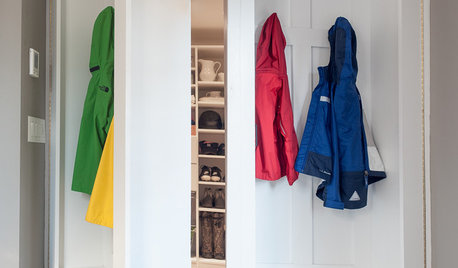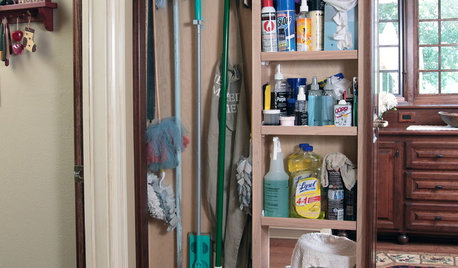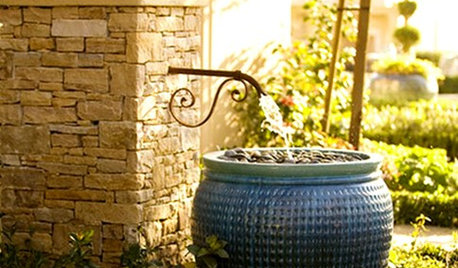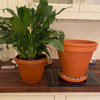'Food Spikes'-- just want your opinion
Lamora
11 years ago
Featured Answer
Sort by:Oldest
Comments (27)
denninmi
11 years agolast modified: 9 years agopirate_girl
11 years agolast modified: 9 years agoRelated Discussions
Opinions wanted: KGRO All-Purpose Plant Food
Comments (3)I have used K-grow formulation for liquid application before. Primarily on tea roses and annuals. Yes it worked fine. A visitor who saw my roses even remarked how lovely they were and that I must have access to some 'special" fertilizer not available to the general public. How suprized they were when I revealed my secret fertilizer was k-grow. I did find that since the nitrogen source is primarily urea, it takes about 2 weeks after application to see any results. Urea must be broken down into a nitrogen form the plants can use. This product is slower to show any results but the cheaper price justified it for me. Just have a little patience when using it....See MoreCan indoor plant food spikes be used inside?
Comments (5)Did you dig a really good hole for the plant? Did you mix in lots of good soil amendments and NO fertilizer? It honestly shouldn't need fertilizer, except perhaps a handfull of cottonseed meal or the like. The spikes, either indoor or outdoor, do not move through the soil. They dissove within a very few inches around them and often, the plant roots nearby get too much and the roots that are further away get none. If the spikes are all you have, and you determine that the plant does need a boost, break them up and mix them with water then apply. The indoor ones should be fine. Now. If you gave your plant a good hole, and especially if you mulched around it too, you are likely watering it too much. Stick your finger into the soil around the plant every few days. Pull your finger out and rub it. Feel moisture? Don't water. Feel completely dry? Water a day sooner next time. If you didn't give the plant a good hole: at least a foot deep and twice the width of the root ball, broken up and turned until soft and crumbly, and mixed with several spadefulls of compost, or manure, or peat moss, etc: then lift the plant and re-dig the hole. If the soil is really dry, fill the hole with water and let it soak in just before you set the plant back inside it and fill in with that nice crumbly soil. Then water again. Be sure the level of the soil around the plant that was in the pot is level with or even an inch above the level of the soil in the ground. It's easy to plant too deep, and a plant's feeder roots cannot get enough oxygen. This will cause wilting and even death. Put a good organic mulch around the plant. Did you miss any of these steps? If so, go outside and fix that thing. Re water and leave it alone. In a week if the plant still looks stressed, then give it some food: half strength liquid fertilizer ONCE. You can fertilize it again next spring....See MoreJust wanted your opinion?
Comments (6)Must be pretty important to you, judging from your quick response -- not. Appears your "recovery" is a ways off, yet. So...you've got what particular advice for other people? I'm thinking maybe you'd best attend to yourself. If you were Joe Hollywood or had something else going on, maybe people would be interested in what you have to say. If you're just another schmuck with problems, good luck about finding publishers or customers. Appears to me you're most likely JAS....See Moreyour opinions on food processors please
Comments (12)I find I use my little (approx. 2-cup capacity) Hamilton Beach Food Chopper more than my 7-cup Quisinart (2-person household). I usually use the small food chopper for grinding nuts into nut meal and finely minced onion. As well as other foods I only need a small amount chopped. I remember when my mother first got her food processor and she made potato pancakes (raw potatoes) the first time. A formerly tedious chore that included scraped knuckles on the grater. She was the happiest person in the world. I have a friend who lost her arm in a farm accident when she was a child and she uses her food processor for making bread dough and pastry (Martha Stewart's recipe). As with many such kitchen "toys", you just determine you are going to figure out as many ways as possible to use it. I have several cookbooks dedicated to the Food Processor. I agree with Annie when it comes to chopping cabbage for sauerkraut - a food processor is the BEST tool for the job. -Grainlady...See Morebirdsnblooms
11 years agolast modified: 9 years agorhizo_1 (North AL) zone 7
11 years agolast modified: 9 years agoLamora
11 years agolast modified: 9 years agoLamora
11 years agolast modified: 9 years agogreenman28 NorCal 7b/8a
11 years agolast modified: 9 years agoHorticultural Help
11 years agolast modified: 9 years agotapla (mid-Michigan, USDA z5b-6a)
11 years agolast modified: 9 years agoHorticultural Help
11 years agolast modified: 9 years agotapla (mid-Michigan, USDA z5b-6a)
11 years agolast modified: 9 years agobirdsnblooms
11 years agolast modified: 9 years agoLamora
11 years agolast modified: 9 years agotapla (mid-Michigan, USDA z5b-6a)
11 years agolast modified: 9 years agobirdsnblooms
11 years agolast modified: 9 years agoLamora
11 years agolast modified: 9 years agotapla (mid-Michigan, USDA z5b-6a)
11 years agolast modified: 9 years agodirtbites
11 years agolast modified: 9 years agotapla (mid-Michigan, USDA z5b-6a)
11 years agolast modified: 9 years agoLamora
11 years agolast modified: 9 years agogreenman28 NorCal 7b/8a
11 years agolast modified: 9 years agotapla (mid-Michigan, USDA z5b-6a)
11 years agolast modified: 9 years agoLamora
11 years agolast modified: 9 years agomeyermike_1micha
11 years agolast modified: 9 years agobirdsnblooms
11 years agolast modified: 9 years agotapla (mid-Michigan, USDA z5b-6a)
11 years agolast modified: 9 years ago
Related Stories

DECORATING GUIDESNo Neutral Ground? Why the Color Camps Are So Opinionated
Can't we all just get along when it comes to color versus neutrals?
Full Story
FARM YOUR YARDHello, Honey: Beekeeping Anywhere for Fun, Food and Good Deeds
We need pollinators, and they increasingly need us too. Here, why and how to be a bee friend
Full Story
RUGS10 Tips for Getting a Dining Room Rug Just Right
Is the rug you’re considering the right size, shape and weave for your dining room? Here’s what to keep in mind
Full Story
MUDROOMSRoom of the Day: This Mudroom Is Just Plain Hot
Wait till you see what’s behind the hooks and bins in this genius family drop zone
Full Story
MOVINGHouse Hunting: Find Your Just-Right Size Home
Learn the reasons to go bigger or smaller and how to decide how much space you’ll really need in your next home
Full Story
DECORATING GUIDESHouzz Tour: Room for Everything in Just 596 Square Feet
Multipurpose furniture, careful color choices and tucked-away storage let a once-cluttered house breathe
Full Story
KITCHEN DESIGN10 Reasons to Love Banquettes (Not Just in the Kitchen)
They can dress up a space or make it feel cozier. Banquettes are great for kids, and they work in almost any room of the house
Full Story
CLOSETSGet Your Broom Closet Just Right
The Hardworking Home: Make cleanup easier with storage space that neatly organizes your equipment and supplies
Full Story
GREEN BUILDINGJust Add Water: Rain Barrel Magic
Take your rainwater storage from practical to beautiful with a new breed of design-friendly rain barrels
Full Story
LANDSCAPE DESIGNHow Low Can Hedges Go? Discover Unusual Garden Borders
Short enough to step over, high enough to be a stretch ... check out these radically different hedge styles and tell us your opinion
Full Story



greenman28 NorCal 7b/8a